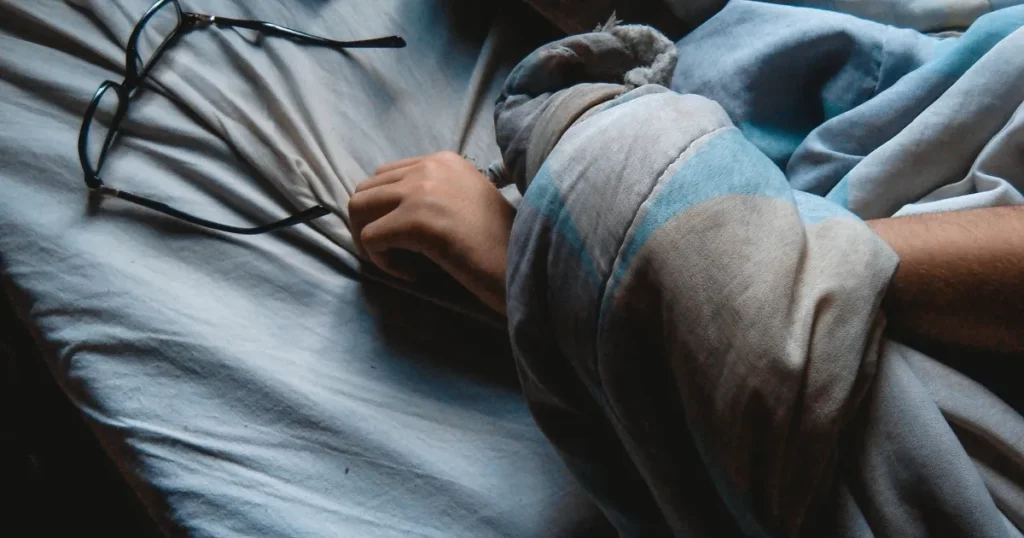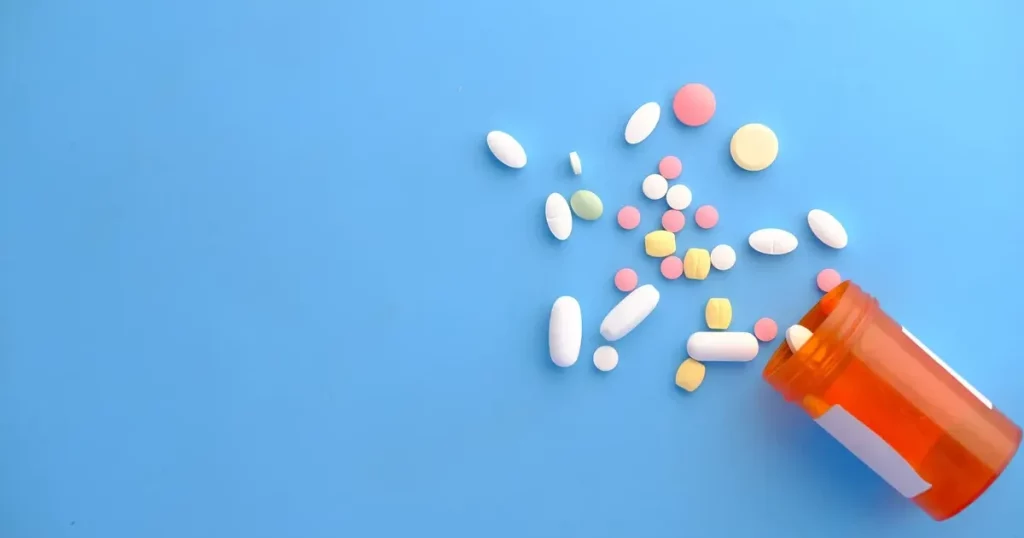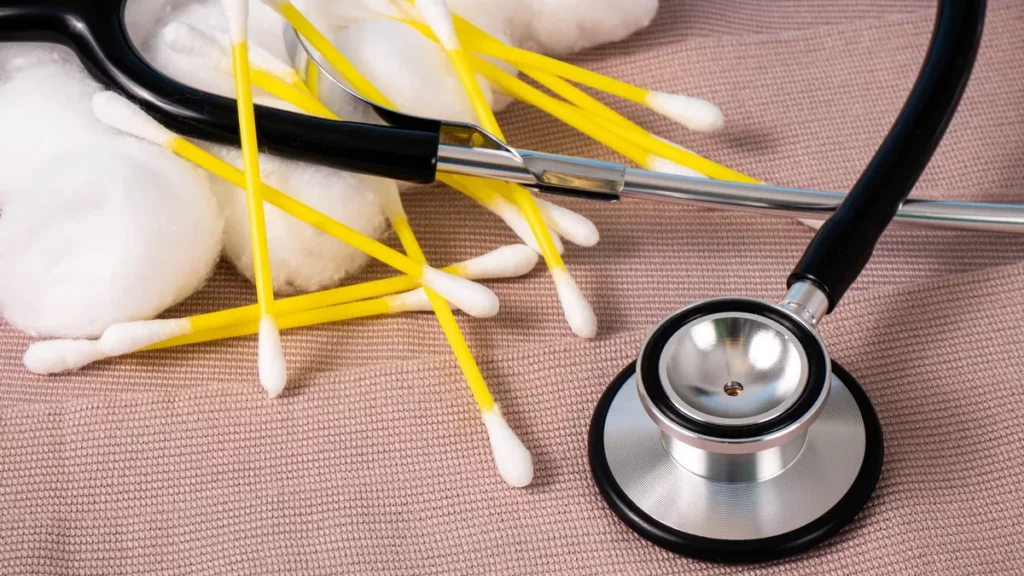Night sweats in men are more common than you think. Night sweats, characterized by excessive sweating during sleep, can lead to damp pajamas or bedding and result in disrupted sleep and discomfort. Although sweating is a natural process that helps regulate body temperature, excessive night sweats may indicate an underlying issue. Men are more prone to experiencing night sweats than women. This article delves into what causes night sweats in men, how to identify and treat it, and when to consult a medical professional.
Table of Contents
I. Common Causes of Night Sweats in Men
A. Hormonal Fluctuations as Causes of Night Sweats

Hormonal imbalances, particularly low testosterone levels, can trigger night sweats in men. Testosterone plays a crucial role in male development and sexual function. As men age, their testosterone levels decrease, leading to a condition called andropause. This hormonal change can result in night sweats[1], along with other symptoms like reduced libido, fatigue, and mood swings.
The hypothalamus, the brain’s temperature-regulating region, may be affected by hormonal imbalances. Consequently, the body’s ability to regulate temperature can be compromised, causing night sweats.
Learn more about the connection between hormones and night sweats here.
B. Sleep Disorders and Night Sweats

Sleep disorders, such as sleep apnea and insomnia, can also lead to night sweats in men. Sleep apnea is characterized by intermittent cessation of breathing during sleep, causing sleep disruptions and decreased blood oxygen levels. Insomnia involves difficulty falling or staying asleep.
Both conditions can trigger night sweats as the body attempts to regulate temperature and restore oxygen levels. Addressing underlying sleep disorders can help minimize night sweats.
Learn more about sleep disorders and night sweats here.
C. Infections: Another Cause of Night Sweats in Men

Some infections causes night sweats, such as tuberculosis (a bacterial infection mainly affecting the lungs) and HIV/AIDS (a viral infection impacting the immune system), can cause night sweats in men. The body may experience night sweats as it tries to regulate temperature and combat pathogens. Treating the underlying infection can help alleviate night sweats.
D. Medications and Night Sweats

Certain medications, like antidepressants and hypoglycemic agents (used to treat diabetes), can cause night sweats as a side effect due to disruption of the body’s temperature regulation. If you suspect your medication is causing night sweats, consult your doctor for potential adjustments or alternatives to mitigate symptoms.
E. Lifestyle Factors Contributing to Night Sweats

Alcohol and drug use, spicy foods, and caffeine consumption can also contribute to night sweats in men. These factors can disrupt the body’s temperature regulation or increase body temperature, leading to night sweats. Reducing or avoiding these triggers can help minimize night sweats.
Read more about lifestyle and night sweats here.
F. Underlying Medical Conditions and Night Sweats

Some medical conditions can be one of the leading causes of night sweats in men. For example, hyperthyroidism, an overactive thyroid, can cause an increase in metabolism and body temperature, leading to night sweats.
Gastroesophageal reflux disease (GERD) can also result in night sweats, as stomach acid reflux can irritate the esophagus, causing discomfort and increased body temperature. If you suspect an underlying medical condition is causing your night sweats, it’s essential to consult with a healthcare professional for proper diagnosis and treatment.
II. Night Sweats in Men: A Possible Symptom of Cancer
Night sweats can be a symptom of certain cancers, specifically lymphoma and leukemia, which affect the lymphatic system responsible for fighting infections and producing immune cells. In this context, night sweats often coincide with other symptoms such as fever, fatigue, and weight loss.
It is crucial to be vigilant about potential cancer warning signs and seek medical attention if you experience persistent night sweats and other related symptoms. Early diagnosis and treatment can improve cancer outcomes.
Learn more about Cancer and Night Sweats Here.
III. Identifying and Managing Night Sweats
A. Symptoms and Signs of Night Sweats
Men typically experience night sweats around the neck and chest or awaken soaked in sweat, leading to disrupted sleep and diminished quality of life.
If you have persistent night sweats, it is essential to identify any underlying causes and seek appropriate treatment. Keeping a sleep diary can help track night sweats and related symptoms, assisting in determining the root cause.
B. Treating Night Sweats in Men
How to treat night sweats in males? To treat night sweats in men, the underlying of causes of night sweats in men must be addressed. Your doctor may recommend medications, lifestyle adjustments, or other interventions depending on the cause.
For instance, if an infection causes night sweats, your doctor may prescribe antibiotics. If a sleep disorder is the cause, a continuous positive airway pressure(CPAP) machine may be recommended to improve your breathing during sleep.
In addition to specific treatments for the underlying causes of night sweats, maintaining a healthy lifestyle can contribute to overall wellbeing and improved sleep quality. Regular exercise, a balanced diet, and stress management techniques, such as mindfulness meditation or yoga, can help support the body’s natural temperature regulation and reduce the frequency and severity of night sweats.
C. Home Remedies And Coping Strategies
Several home remedies can help alleviate night sweats, including:
- Using a fan or air conditioner to maintain a comfortable room temperature
- Wearing breathable cotton pajamas and using cotton sheets
- Keeping a glass of cold water nearby to sip throughout the night
- Practicing relaxation techniques such as deep breathing or meditation before bed
- Avoiding heavy meals or exercise before bedtime
IV. Seeking Professional Help
If you are experiencing persistent night sweats or other concerning symptoms, it’s crucial to consult a healthcare professional. A doctor can help determine the underlying cause of your night sweats and recommend appropriate treatments or lifestyle adjustments.
In some cases, a referral to a specialist, such as an endocrinologist or sleep specialist, may be necessary for further evaluation and management of your condition.
V. Preventing Night Sweats
Although it may not be possible to prevent all instances of night sweats, adopting a healthy lifestyle and addressing any underlying conditions can help minimize their occurrence. Some preventative measures include:
- Regularly monitoring and managing chronic conditions, such as diabetes or high blood pressure
- Practicing good sleep hygiene, including establishing a consistent sleep schedule and creating a comfortable sleep environment
- Reducing exposure to known triggers, such as alcohol, spicy foods, and caffeine
- Regularly changing bed linens to maintain a clean and comfortable sleep environment
- Staying well-hydrated to help the body regulate temperature effectively
By focusing on prevention, you can work towards reducing the frequency and impact of night sweats on your daily life.
VI. Frequently Asked Questions
When should I be concerned about male night sweats?
If you experience persistent night sweats, it is crucial to seek medical attention. Night sweats can be a symptom of an underlying condition that requires treatment. If night sweats are accompanied by other symptoms such as fever, fatigue, or weight loss, seek medical attention immediately.
Why are night sweats a red flag?
Night sweats can be a red flag for an underlying medical condition, particularly if they are persistent and accompanied by other symptoms. Seeking medical attention can help diagnose and treat any underlying conditions.
Are night sweats related to heart problems in men?
While night sweats can be a symptom of heart problems in men, they are more commonly associated with other conditions such as hormonal imbalances, infections, and sleep disorders. If you experience persistent night sweats, consult your doctor to determine the underlying cause.
Are night sweats a sign of hormonal imbalance in men?
Yes, night sweats can be a sign of hormonal imbalances in men, particularly low testosterone levels. As men age, testosterone levels may decrease, leading to andropause, which can cause night sweats along with other symptoms such as reduced libido, fatigue, and mood swings. If you suspect hormonal imbalances are causing your night sweats, consult a healthcare professional for proper evaluation and treatment.
Can anxiety cause night sweats in men?
Yes, anxiety can cause night sweats in men. Stress and anxiety can disrupt the body’s temperature regulation and lead to increased sweating, including during sleep. Practicing stress management techniques, such as deep breathing exercises, mindfulness meditation, or yoga, can help reduce anxiety and alleviate night sweats.
What can I do to minimize the impact of night sweats on my sleep?
To minimize the impact of night sweats on your sleep, try the following strategies:
– Maintain a cool and comfortable room temperature using a fan or air conditioner
– Wear breathable cotton pajamas and use cotton sheets
– Keep a glass of cold water nearby to sip throughout the night
– Practice relaxation techniques, such as deep breathing or meditation, before bed
– Avoid heavy meals or exercise before bedtime
Conclusion
So causes night sweats in men? The answer is that night sweats in men can signal an underlying issue or can just be sign of a men entering Andropause. Either way, night sweats lead to disrupted sleep and decreased quality of life. Determining the root cause is vital for choosing the appropriate treatment. If you experience persistent night sweats, seek medical attention to diagnose and treat any underlying conditions. Adopting a healthy lifestyle can also help reduce the incidence of night sweats.
Medical Disclaimer: This article is for informational purposes only and should not be considered professional medical advice. It is always recommended to consult with a healthcare professional before making any changes to your treatment plan, diet, or lifestyle. StopTheNightSweats.com is not responsible for any actions taken as a result of the information provided in this article.
Sources:
- Prevalence of hypogonadism in males aged at least 45 years: the HIM study
- Male hypogonadism: Symptoms and treatment. Journal of Advanced Pharmaceutical Technology & Research
